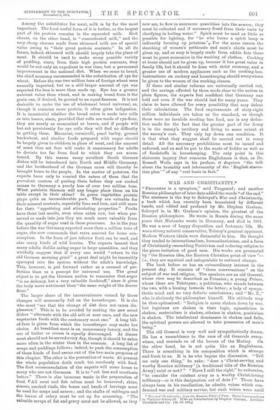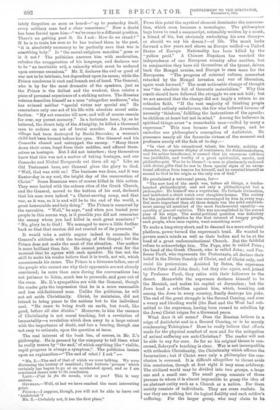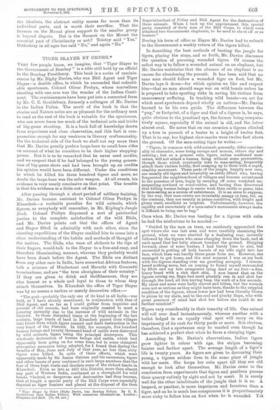WAR AND CHRISTIANITY.* "PROGRESS is a symptom," said Turgenief ;
and another Russian philosopher of later date added the words "of the end." The sentence is the key to Solovyof's War and Christianity, a, book which has recently been translated by different hands, and edited and prefaoed by Mr. Stephen Graham. Solovyof is, in Mr. Graham's opinion, the greatest of the Russian philosophers. He wrote in Russia during the same years that Nietzsche wrote in Germany, and died in 1901. He was a man of happy disposition and fortunate life. He was a strong natural conservative, Tolstoy's greatest opponent. Modern Western ideals were distasteful to him. He thought they tended to internationalism, humanitarianism, and a form of Christianity resembling Positivism and reducing religion to the pious imitation of good men. His works are permeated by "the Russian idea, the Eastern Christian point of view"- i.e., they are mystical and antagonistic to outward change.
The book before us has an extraordinary interest in the present day. It consists of "three conversations" on the subject of war and religion. The speakers are an old General, whose view may be described as Prussian ; a young Prince, whose ideas are Tolstoyan; a politician, who stands between the two, with a leaning towards the latter ; a lady of sympa- thetic mind and no very definite conclusions ; and "Mr. Z.," who is obviously the philosopher himself. His attitude may be thus epitomized : " Religion is never shaken down by war, but logicians are shaken in their logic, agnosticism is shaken, materialism is shaken, atheism is shaken, positivism is shaken. The intellectual dominance is shaken and falls, the spiritual powers are allowed to take possession of men's being."
The old General is very well and sympathetically drawn. He has a resemblance to the race of old Generals every. where, and reminds us of the heroes of the Mutiny. On the other hand, he is not quite like an Englishman. There is something in his composition which is strange and fresh to us. It is be who begins the discussion. "Tell me only one thing," he asks : "does a' Christ-serving and worthy Russian militancy' [a traditional title of the Russian Army] exist or not ? " " Have I still the right," he reiterates, " to consider the existent army as a worthy Christ-loving militancy—or is this designation out of date P" There have always been in his recollection, he admits, voices which con- demned war and military service, but such voices were until War and Christianity : frau the Russian Pant of View. Three Conversations by Vladimir Solovyof. With an Introduction by Stephen anthem, Louden' Constable and Vet lie, dd. net, lately forgotten as soon as beard—" up to yesterday itself, every military man had a clear conscience." Now a doubt has been forced upon him—" we've come to a different position. There's no getting past it. So I ask : How do we stand ? " If he is to train his men as he has trained them in the past, "it is absolutely necessary to be perfectly sure that war is something holy." Is " the moral-religious sanction" gone or is it not P The politician answers him with moderation, rebukes the exaggeration of his language, and declares war to be "an inevitable evil, a calamity which must be endured upon extreme occasions." Mr. Z. declares the evil or good of war not to be intrinsic, but dependent upon its cause; while the Prince condemns it root and branch out of hand. The General, who is by far the most dramatic of the speakers, just as the Prince is the dullest and the weakest, then relates a piece of personal experience of a striking nature. The Russian veteran describes himself as a man "altogether mediocre," who has evinced neither " special virtue nor special sin." He remembers only one act of his life with absolute moral satis- faction. "My act remains till now, and will of course remain for ever, my purest memory." In a fortunate hour, by, as he believed, the direct help of the Almighty, he killed a thousand men to redress an act of brutal murder. An Armenian village had been destroyed by Bashi-Bazouks ; a woman's child bad been burned before her eyes. The General and his Cossacks chased and entrapped the enemy. "Many threw down their arms, leapt from their saddles, and offered them- selves as hostages. But I did not interfere ; they themselves knew that this was not a matter of taking hostages, and our Cossacks and Nizhni Novgorods cut them all up." Like an Old Testament hero, our General gives the glory to God. " Well, God was with us I The business was done, and it was Easter-day in my soul, the bright day of the resurrection of Christ." Some Russians were of course killed in this action. They were buried with the solemn rites of the Greek Church, and the General, moved to the bottom of his soul, declared that his men were indeed "a Christ-serving army, and that war, as it was, so it is and will be to the end of the world, a great honourable and holy doing." The Prince is unmoved by the narrative. " Well," he says, "and when you buried your people in this serene way, is it possible you did not remember the enemy whom you had killed in such great numbers P " " No, glory be to God I We managed to move a little further back so that that carrion did not remind us of its presence."
It would take a subtle arguer indeed to reconcile the General's attitude with the teaching of the Gospel; but the Prince does not make the most of the situation. Our author is more brilliant than fair. He cannot pretend even for the moment that he agrees with each speaker. He has not the skill to make his reader believe that it is truth, not wit, which recommends his cause. The Prince is a tiresome talker, one of the people who cannot see why their opponents are not already convinced; he more than once during the conversations has not patience to listen, much less to persuade, and goes out of the room. Mr. Z.'s sympathies are with the General, though the reader gets the impression that he is a more reasonable and less old-fashioned man. Unlike the politician, he will not set aside Christianity. Christ, he maintains, did not intend to bring peace to the nations but to the individual soul. "He came to bring truth on earth, but truth, like good, before all else divides." Moreover, to him the essence of Christianity is not moral teaching, but a revelation of immortality—a revelation which does away to a large extent with the importance of death, and has a bearing, though one not easy to estimate, upon the question at issue.
The real interest of the book lies, of course, in Mr. Z.'s philosophy. He is pressed by the company to tell them what he really means by "the end," of which anything like " visible, rapid progress is always a symptom." The politician insists upon an explanation—" The end of what ? I ask " :— " Z.—The end of that of which we were talking. We were discussing the history of mankind ; that historic 'process' which certainly has begun to go at an accelerated speed, and as I am convinced draws near to its conclusion.
LADY.—C'est la fin du monde, n'est de pas? This is very curious.
GENERAL.—Well, at last we have reached the most interesting point. suppose, though, you will not be able to leave out 'Antichrist' P Mn. Z.—Certainly not, it has the first place." From this point the mystical element dominates the conversa- tion, which soon becomes a monologue. The philosopher begs leave to read a manuscript, ostensibly written by a monk, a friend of his, but obviously embodying his own theory— or should we say his dream ?—of life. The monk looks forward a few years and shows us Europe unified—a United States of Europe. Nationality has been killed by the "yellow peril." A Chinese Napoleon has wreaked the independence of one European Country after another, but in conjunction they have rid themselves of the tyrant, driven back the Mongol armies, and Europe is once more for the Europeans. " The progress of external culture, somewhat retarded by the Mongol invasion and war of liberation, again went forward." The most noticeable change of thought was "the absolute fall of theoretic materialism." Why this result should have followed the struggle we are not told; but we are assured that the change did not imply a return to an orthodox faith. "If the vast majority of thinking people remained entirely unbelievers, the few who believed became of necessity 'thinkers,' fulfilling the instructions of the apostle : be children at heart but not in mind." Among the believers in spiritual things arose "a remarkable man—called by many a superman." This man became Lord of Europe, and he embodies our philosopher's conception of Antichrist. He possesses nearly all the favourite virtues of the moment and professes nearly all the fads of to-day :- "In view of his exceptional talent, his beauty, nobility of character, his supreme display of continence, his disinterestedness, and his active beneficence, it seemed that his enormous self-love was justifiable, and worthy of a great spiritualist, ascetic, and philanthropist. Was he to blame ?—a man so plenteously endowed with divinexifts that ho saw in, them special signs of an excep- tional affection from heaven for himself, and he counted himself as second to God in his origin as the only son of God."
He proclaimed a universal peace, for-- "The new lord of the earth was, before all things, a tender. hearted philanthropist, and not only a philanthropist but a philosopher. He himself was a vegetarian. Ho forbade vivisection, and instituted a strict watch over slaughter-houses. The society for the protection of animals was encouraged by him in every way. But more important than all these details was the solid establish. mint among all mankind of the most fundamental equality—an equality of general repletion. This was accomplished in the second year of his reign. The social-political question was definitely settled. But if repletion be the first interest of hungry people, such people, when once replete, want something more."
To make a long story short, and to descend to a more colloquial platform, power turned the superman's head. He wanted to govern men's minds as well as their bodies and to be at the head of a great undenominational Church. But the faithful refuse to acknowledge him. The Pope, who is called Peter; the head of the Greek Church, who is called John ; and Pro- fessor Pauli, who represents the Protestants, all declare their belief in the Divine Sonship of Christ, and of Christ only, and resist his pretensions. Assisted by Satan, the superman strikes Peter and John dead; but they rise again, and, joined by Professor Pauli, they retire with their followers to the desert. Meanwhile the superman declares himself to be the Messiah, and makes his capital at Jerusalem ; but the Jews head a rebellion against him, which, breaking out among the Jews in every country, finally destroys his yoke. The end of the great struggle is the Second Coming, and over a weary and bleeding world (the East and the West had sub- mitted to the superman, having been roused to rebellion by the Jews) Christ reigns for a thousand years.
What does it all mean ? Does the Russian believe in a reign of Antichrist and in a Second Coming, or is he merely condemning Tolstoyism ? Does be really believe that efforts made for the physical comfort of men and for the mitigation of animal suffering are anti-Christian P The reader will not be able to say for sure. So far as his original theme is con- cerned, Solovyof's teaching is clear. War is not incompatible with orthodox Christianity, the Christianity which affirms the Incarnation ; but if Christ were only a philosopher the con- clusion is reversed. It is difficult altogether to thrust aside this conclusion, though at first sight it may seem arbitrary. The civilized world may be divided into two groups, a large one and a small one. The small group consists of those persons to whom it is almost impossible to grasp the idea of an abstract entity such as a Church or a nation. For them society consists of individuals. They are crass realists. In war they see nothing but its logical futility and each soldier's suffering. For the larger group, who may claim to be the idealists, the abstract entity means far more than its individual parts, and is worth their sacrifice. That the Sermon on the Mount gives support to the smaller group is beyond dispute. But is the Sermon on the Mount the essential part of Christianity or not P Tolstoy said " Yes." Orthodoxy in all ages has said " No," and again " No."


















































 Previous page
Previous page